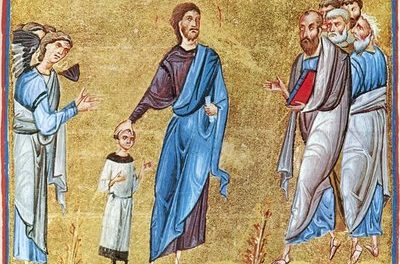Sunday, September 11, 2011 – Twenty-Fourth Sunday in Ordinary Time
Sir 27:30 – 28:7; Ps 103:1-2,3-4,9-10,11-12; Rom 14:7-9; Mt 18: 21-35
“Can anyone nourish anger against another and expect healing from the LORD?” (Sir 28:3)
On this tenth anniversary of September 11, 2001, the readings seem to be anything but subtle. We cannot be people in need of mercy and yet fail to grant that mercy to others. Of course, we certain can be such people. But if we are, we will never be able to experience true compassion or to pursue a life of Christian discipleship.
With nearly every US publication issuing its own commemoration of this tenth anniversary, there is no lack of resources for contemplation. With so much already said, it is a daunting task to speak further words into this space of national memory and grief. Yet, the words we are given this Sunday seem to speak for themselves.
The parable of the Unforgiving Servant from this week’s Gospel is one of my favorite passages from all of Scripture. With one short story, we are confronted by God’s boundless mercy and the concomitant expectation that we be givers of mercy ourselves. It is not a matter of earning God’s forgiveness by forgiving our brothers and sisters, however. The point is to show that the virtue needed to grant mercy to others is the same virtue needed to receive that mercy from God.
At the beginning of the story, when the servant is called to task for his immense debt, he pleads: “Be patient with me, and I will pay you back in full.” The servant is surely aware of his indebtedness and vulnerability. Yet, in the parable, when the whole of the debt is erased in a moment of stunning compassion, the servant remains silent and seemingly untouched by the affair. He goes about his business, confronting a fellow servant about a small amount owed, and fails to recognize his own recent pleading in the words of the fellow servant: “Be patient with me, and I will pay you back.” Or perhaps the unforgiving servant did recognize this nearly verbatim repeat of his own request. At the end of the day, simply recognizing our own need does not magically transform us into a person who is moved by the needs of others.
The hard-heartedness that prevents us from forgiving others is that same hard-heartedness that prevents us from truly receiving the mercy and healing that we so desperately need. Thus, when the master summons the servant, he calls him “wicked.” Indeed, it seems that the unforgiving servant is vicious in his unwillingness to relieve his fellow servant of debt. And it is this same vice, this habit of pride and isolation, that prevents the servant from embracing the mercy granted by the master. The unforgiving servant may recognize his own need but he never seems to make the next step to recognize his radical dependence on the master’s unbounded goodness. And without this, the servant is very lost indeed.
Tomorrow afternoon, students and faculty at my university will gather with this 10-year anniversary in mind and will try to answer the question, “Who Are We Now?” I wonder if part of the honest answer to that question recalls the vice of the unforgiving servant. If we are not prepared to lavish mercy on those who have wronged us, attacked us, terrorized us . . . then we cannot be healed. It is one and the same virtue that is able to accomplish both. We cannot know God’s compassion unless we live lives of showering that compassion on those who, like us, are undeserving. I wonder if the honest answer is that, like the servant, we are all too aware of our need and our vulnerability but we have not made the next step to embrace our dependence.
One of my most vivid memories from the days following September 11, 2011 came from a student/faculty gathering at my graduate school. As dust still hovered over Ground Zero, a student and religious from Rwanda spoke of his profound hope – hope that the United States would seize this opportunity to show the world that violence must be met with forgiveness. His own experience of genocide and terror-returned-for-terror made his hope all the more palpable.
I believe that student’s hope has been deferred. Our national narrative has not yet been dominated by the language of mercy and forgiveness. But as we continue to seek healing, we can pursue that one virtue that softens the heart both to forgive injuries inflicted and to embrace the mercy that we so desperately need.


